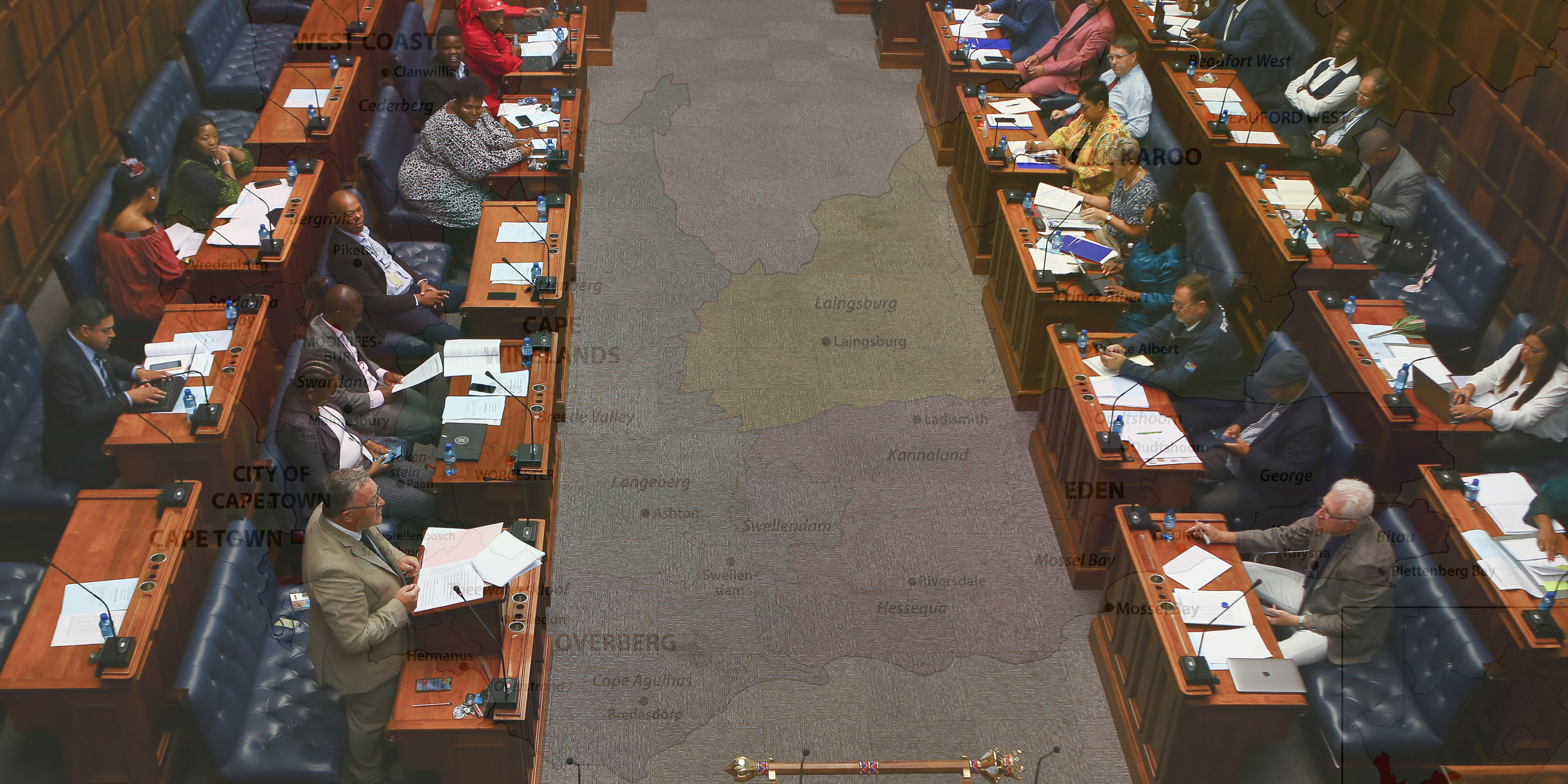Respect, a signed coalition agreement and humility are three of the key takeaways that parties in the Western Cape say are essential to a working coalition, and to the Government of National Unity (GNU).
After the 2021 municipal elections, 16 of 30 Western Cape municipalities were run by a coalition government of sorts after parties failed to win outright majorities. The governance of these municipalities has fallen to a range of parties, from the Democratic Alliance (DA), African National Congress (ANC), Freedom Front Plus (VF Plus), the Patriotic Alliance (PA) to the Good party, and in some cases, local parties.
Now, these parties sit at the centre of a GNU that seems to grind to a halt every time a controversial law or even the Budget is discussed. What does it take for a coalition to succeed or fail?
1. Respect
Western Cape DA leader Tertuis Simmers told Daily Maverick that the party had been part of coalitions since 2006 after Helen Zille led a multiparty coalition in the City of Cape Town, to become mayor that year.
“There already we started learning valuable lessons in realising that as much as you might have the most number of seats in the coalition, you are still part of a coalition government, which means you need to respect the coalition partners who are in coalition with you,” he said.
The party has since become one of the two leading parties in a highly contested province at the municipal level. After the 2021 local government elections, the party needed coalitions to govern municipalities such as Cederberg, Knysna, George and the Garden Route District Municipality.
In response to this, ANC Western Cape provincial secretary Neville Delport said that “we fully agree — respect and common ground are essential. But let’s be honest: the DA hasn’t always practised what it preaches. Too often, they approach coalitions as a means of control rather than cooperation, which is why so many of their partnerships have collapsed.”
Fractures between parties have frequently emerged, and the DA has often been pointed at as being a big part of the problem, including in the GNU, as Daily Maverick reported during the Budget fracas.
2 A signed agreement
It’s as easy as a signed coalition agreement, says Simmers. “The party has structured various coalition agreements which bind all parties,” he said.
These included clauses in these agreements laying out how to deal with internal conflicts.
“We’ve seen the maturity of our agreements, the way we structure these agreements – other parties tend to want to coalesce on positions and power at all costs; the DA does the opposite,” Simmers said.
The ANC’s Delport agreed: “For a coalition to thrive, there must be written agreements. These agreements must outline roles, responsibilities and shared principles. Political leadership must be engaged — not just local councillors, but leaders at the provincial and national level must also meet regularly to maintain alignment.”
The Good party’s Brett Herron took a different route. The party has worked with both the DA and the ANC to govern Theewaterskloof (the municipality governing towns such as Caledon, Greyton and Villiersdorp). Currently, the municipality is governed by a DA/Good/ Socialist Revolutionary Workers Party (SRWP) coalition.
Herron told Daily Maverick that respect and a coalition agreement were one thing, but what also made a good coalition “is an understanding that we are co-governing more than any written document will provide – so really it’s about the characteristics of the leadership and their representatives in those councils.”
He said Good found that without a leadership that was “fully committed to the coalition” and that understood that it was co-governance rather than which party was bigger, then “you’re co-governing without that understanding, the coalition agreements you sign are actually worthless – so it’s about an attitude rather than a document”.
3. Be humble
“A good coalition partner is one that is committed to the coalition and that is humble, and one that is honest, and one that understands that without the other coalition partners, you can have no power whatsoever,” said Freedom Front Plus leader Dr Corné Mulder.
The party governs Oudtshoorn in what is termed a “Government of Local Unity” alongside the ANC and regional parties.
But what makes a bad coalition partner? According to Mulder, it is “one that is arrogant – and one that does not listen to the other coalition partners”.
He continued: “…and one that continues to behave as if they’ve got a majority on their own”.
The ANC’s Neville Delport told Daily Maverick that “coalitions must never lose sight of why they exist — to serve the people. When coalitions become about positions, power or political games, they fail. When they focus on basic services, good governance and putting communities first, they can succeed.”
The ANC governs several Western Cape municipalities such as Knysna, Cederberg and Laingsburg.
‘Voters rejected you – so now you need a coalition’
“Well, the most important thing one needs to understand is that because of the election result… no party can govern on their own,” Mulder said. As a party, “you have to place the bigger interests above your own particular party interest and you also have to understand that your manifesto did not get sufficient support to be the majority, and that goes for the other parties as well”.
After that, emphasis must not be placed on a joint programme of action, but rather on leadership positions such as mayor and speaker.
Simmers told Daily Maverick that based on the DA’s experience, while various parties had their manifestos during campaigns, what was key was how these various manifestos “find expression in your coalition government”, which in local government came via the municipal Integrated Development Plan, which guided and informed a municipal budget.
Why does the GNU keep failing?
Mulder told Daily Maverick that the “GNU started off about positions, because we were forced by the Constitution to form an executive within 14 days, so within 14 days there had to be an agreement to elect a president; he appointed the executive”.
Mulder said this happened without parties fully agreeing on a new programme that everyone could buy into, and “because of that, there are now all kinds of tensions and we just take it one step back”.
According to Herron, the simple answer lay in the question, “Where is the GNU lekgotla?”
He explained: “The GNU has different problems from what you have in local municipalities… different dynamics and different mandates. The problem in the GNU is that the Statement of Intent, which is the coalition agreement for this multiparty coalition that makes it the GNU, wasn’t implemented.”
Herron, who sits on the GNU clearing house as a representative of Good, said the Statement of Intent was similar to those signed at local levels.
“If you look at the Statement of Intent, it says that the parties will, immediately after signing the statement, have a lekgotla or a breakaway and work out the governing programme for the Government of National Unity – that never happened.”
Herron said, “The Cabinet was all appointed and as soon as they became Cabinet ministers, the Cabinet went off and had a lekgotla and decided on the medium-term development policy or framework.”
He reminded: some GNU parties were part of the Cabinet, but others, such as Rise Mzansi, United Democratic Movement and Al Jama-ah, were not and occupied roles such as heads of parliamentary committees and deputy ministry positions.
“So in the GNU, part of the problem, and why we’re seeing some of this turbulence, is that the parties never actually implemented the Statement of Intent as it was drafted, which was to do this breakaway and work out our our programme, our governing programme, and then once we had that agreement, we wouldn’t even have had this Budget fallout.”
Herron said that looking at some of the demands raised by the DA during the contested Budget process, “they were policy reforms, they were not financial inputs… they were policy reforms like concessioning the ports and improving the electricity supply regime or opening it up.” DM





